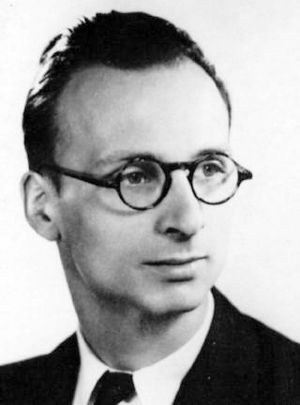Jehan Alain facts for kids
Quick facts for kids
Jehan Alain
|
|
|---|---|

Alain in 1938
|
|
| Born |
Jehan-Ariste Paul Alain
3 February 1911 |
| Died | 20 June 1940 (aged 29) Saumur, France
|
| Occupation | Organist, composer, and soldier |
Jehan-Aristide Paul Alain (born February 3, 1911 – died June 20, 1940) was a very talented French organist, composer, and soldier. He grew up in a family of musicians. He learned to play the organ from his father. Jehan started writing his own music when he was 18. He kept composing for ten years until World War II began.
His music was influenced by older composers like Claude Debussy. He also loved music, dance, and ideas from the Far East. When World War II started, Alain joined the French Army. He became a dispatch rider, delivering messages on his motorcycle. He bravely fought in the Battle of Saumur, where he was killed at just 29 years old.
His younger brother, Olivier Alain, was also a composer and organist. His youngest sister, Marie-Claire Alain, was a famous organist. She helped make her brother's music well-known around the world.
Jehan Alain's Life Story
Jehan Alain was born in Saint-Germain-en-Laye, a town near Paris, France. His family was full of musicians. His father, Albert Alain, played the organ and wrote music. He even built a four-manual organ in their living room! Jehan learned piano from Augustin Pierson. He learned organ from his father. By age 11, Jehan was already playing the organ at St. Germain-en-Laye church.
Between 1927 and 1939, Jehan studied at the Paris Conservatoire. This is a famous music school. He won top awards for harmony and fugue. He also studied organ with Marcel Dupré, a very famous organist. In 1939, Jehan won first prize for organ playing and improvisation. He also studied composition with important teachers like Paul Dukas. In 1936, he won an award for his Suite for Organ.
In 1935, he became the organist at a church in Paris. He played there for four years. He also played regularly at a synagogue. The only known recording of him playing is a six-minute improvisation from 1938.
His Unique Music
Jehan Alain started composing in 1929 when he was 18. His short career lasted until World War II began. His music was special and had many influences. He was inspired by the musical style of Claude Debussy. He also liked the music of his friend Olivier Messiaen.
Alain was very interested in the music, dance, and ideas from the Far East. He learned about these at a big international exhibition in 1931. You can hear this influence in pieces like Deux danses à Agni Yavishta. He also loved old Baroque music and even jazz!
One of his pieces, Le jardin suspendu (The Hanging Garden), shows his artistic ideas. He said it was about an artist's endless search for a perfect, safe place.
Jehan Alain wrote many types of music. He composed choral music, including a Requiem Mass. He also wrote chamber music (for small groups of instruments) and piano pieces. But he is most famous for his organ music. His best-known work is Litanies, written in 1937. This piece is about a Christian soul praying to God with strong faith when words are not enough. Another piece, Deuils (Mourning), is a sad dance dedicated to his deceased sister, Odile.
A Brave Soldier
Jehan Alain was always interested in machines. He was a skilled motorcyclist. When World War II started, he joined the French Army. He became a dispatch rider, using his motorcycle to deliver important messages.
On June 20, 1940, he was on a mission near Saumur, France. He was checking on German troop movements. He came across a group of German soldiers. He bravely fought them with his machine gun. He refused to surrender. Sadly, he was killed in this battle.
After his death, he was given the Croix de Guerre award for his bravery. He was buried where he fell. Jehan Alain left behind his wife, Madeleine, and their three children: Denis, Agnès, and Lise. His compositions are still considered some of the most original of the 20th century.
Other famous composers have honored Jehan Alain. Henri Dutilleux included a part of Alain's music in his piece Les citations. Maurice Duruflé wrote an organ piece called Prélude et fugue sur le nom d'A.L.A.I.N as a tribute to him.
See also
 In Spanish: Jehan Alain para niños
In Spanish: Jehan Alain para niños
 | Selma Burke |
 | Pauline Powell Burns |
 | Frederick J. Brown |
 | Robert Blackburn |

